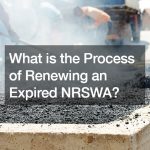
What is the Process of Renewing an Expired NRSWA?

If you work in the realm of roadworks and street maintenance, holding a valid New Roads and Street Works qualification (NRSWA) is not just advantageous but mandatory. However, like many certifications, the NRSWA qualification has an expiration date, typically set at five years. Once your qualification expires, you cannot legally work on road-related projects until you renew it. So, how do you navigate the process of renewing an expired NRSWA qualification and get back to work? Let’s delve into the step-by-step process.
Understanding NRSWA Renewal
Before diving into the renewal process, it’s essential to grasp the significance of maintaining an up-to-date NRSWA qualification. This qualification ensures that individuals possess the necessary skills and knowledge to carry out street works safely and effectively, minimizing risks to both workers and the public.
Video Source
Knowing When Your Qualification Expires
First and foremost, it’s crucial to keep track of when your NRSWA qualification is set to expire. Typically, this expiration period is five years from the date of issue. Failing to renew your qualification before it expires means you are no longer certified to work on road projects, which can impact your employment opportunities and legal compliance.
The Reassessment Option
Fortunately, renewing an expired NRSWA qualification doesn’t always mean starting from scratch. The reassessment option allows individuals to renew their qualifications within five years of expiration without retaking the full course. This option saves time and effort while ensuring that individuals remain compliant with industry standards.
What the Reassessment Involves
The reassessment process consists of both theory refresher training and assessments for each unit code that needs renewal. Participants undergo classroom-based training to refresh their knowledge of NRSWA guidelines and regulations. Following the training, individuals must complete assessments for each unit code they wish to renew. Each assessment comprises 20 multiple-choice questions, and participants have 45 minutes to answer them.
Scoring and Passing
To pass the assessment, participants must achieve a score of 80 or higher. Successfully passing the reassessment demonstrates that individuals possess the requisite knowledge and understanding to continue working safely on road-related projects.
Getting Your NRSWA Card
Once you’ve completed the reassessment process and achieved passing scores for all relevant unit codes, you are eligible to receive your renewed NRSWA qualification card. This card serves as tangible proof of your certification and allows you to resume work on road projects without any legal barriers.
Next Steps
If your NRSWA qualification is nearing its expiration date or has already expired, it’s essential to take proactive steps to renew it. Reach out to your training provider or consult relevant resources to learn about available reassessment courses and booking options. By staying proactive and ensuring your qualifications are up to date, you can continue working safely and legally in the field of roadworks and street maintenance.
Legal Implications of Working Without Valid Qualification:
Working on road projects without a valid NRSWA qualification can have serious legal implications. In many jurisdictions, it is a legal requirement for individuals to get an NRSWA card qualification when carrying out street works or road maintenance activities. Failure to comply with this requirement can result in legal consequences for both the individual and the employer.
One of the primary legal implications of working without a valid NRSWA qualification is the risk of facing fines or penalties. Regulatory authorities responsible for overseeing roadworks and street maintenance projects often conduct inspections to ensure compliance with NRSWA regulations. If an individual is found to be working without the required qualification, they may be subject to fines imposed by regulatory bodies.
Moreover, working without a valid NRSWA qualification can also lead to legal liability in the event of accidents or incidents on the worksite. Without the necessary training and certification, individuals may lack the knowledge and skills to safely carry out their duties, increasing the risk of accidents, injuries, or damage to property. In such cases, both the individual and the employer may be held liable for any harm caused, leading to potential legal claims or lawsuits.
Additionally, non-compliance with NRSWA regulations can tarnish the reputation of individuals and companies within the industry. Being found in violation of regulatory requirements can damage trust and credibility with clients, stakeholders, and regulatory authorities, potentially leading to loss of business opportunities and reputational damage.
To mitigate these legal risks, it is essential for individuals and employers to ensure that all personnel involved in street works and road maintenance hold valid NRSWA qualifications. This involves staying updated on renewal requirements, scheduling reassessment courses in a timely manner, and maintaining accurate records of qualifications for compliance purposes.
Career Advancement Opportunities:
Renewing an expired NRSWA qualification opens up various career advancement opportunities in the field of roadworks and street maintenance. Holding a valid NRSWA card demonstrates a commitment to professional development and competence in carrying out street works according to regulatory standards.
With a renewed NRSWA qualification, individuals may qualify for higher-paying positions, increased responsibilities, and enhanced job prospects. Many employers prefer candidates with up-to-date NRSWA certifications, as it ensures compliance with legal requirements and proficiency in relevant skills and knowledge.
Moreover, individuals with renewed NRSWA qualifications may explore specialized roles within the roadworks industry, such as project management, supervision, and consultancy. These roles often offer greater autonomy, leadership opportunities, and potential for career growth.
Continuing education and skill development are essential for maintaining NRSWA certification and staying competitive in the industry. By pursuing additional training, certifications, and professional development opportunities, individuals can further enhance their expertise and advance their careers in roadworks and street maintenance.
.